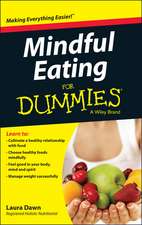Intervention Strategies for Changing Health Behavior: Applying the Disconnected Values Model
Autor Mark H. Anshelen Limba Engleză Paperback – 21 dec 2015
| Toate formatele și edițiile | Preț | Express |
|---|---|---|
| Paperback (1) | 482.53 lei 6-8 săpt. | |
| Taylor & Francis – 21 dec 2015 | 482.53 lei 6-8 săpt. | |
| Hardback (1) | 1000.61 lei 6-8 săpt. | |
| Taylor & Francis – 12 dec 2015 | 1000.61 lei 6-8 săpt. |
Preț: 482.53 lei
Nou
Puncte Express: 724
Preț estimativ în valută:
92.33€ • 96.40$ • 76.42£
92.33€ • 96.40$ • 76.42£
Carte tipărită la comandă
Livrare economică 05-19 aprilie
Preluare comenzi: 021 569.72.76
Specificații
ISBN-13: 9781138908123
ISBN-10: 1138908126
Pagini: 230
Ilustrații: 7 black & white tables
Dimensiuni: 152 x 229 x 15 mm
Greutate: 0.29 kg
Ediția:1
Editura: Taylor & Francis
Colecția Routledge
Locul publicării:Oxford, United Kingdom
ISBN-10: 1138908126
Pagini: 230
Ilustrații: 7 black & white tables
Dimensiuni: 152 x 229 x 15 mm
Greutate: 0.29 kg
Ediția:1
Editura: Taylor & Francis
Colecția Routledge
Locul publicării:Oxford, United Kingdom
Cuprins
Part 1: The Need to Change Health Behavior 1. Explaining the Causes of Unhealthy Habits: Our Self-Destructive Nature 2. Challenges of Changing Health Behavior Part 2: Theoretical Foundations and Support 3. Psychological Benefits of Physical Activity 4. Strengths and Limitations of Existing Theories and Models in Health Behavior Change 5. Theoretical and Empirical Support for the Disconnected Values Model Part 3: Describing the Disconnected Values Model 6. Negative Habits 7. Performance Barriers 8. Perceived Benefits, Costs, and Consequences 9. Values 10. Disconnects between Negative Habits and Core Values 11. Determining and Carrying Out an Action Plan Part 4: Adherence and Compliance to New Healthy Habits 12. Adherence and Compliance to Healthy Habits 13. Steps for Achieving Adherence to New (Healthy) Habits Part 5: Cognitive and Behavioral Strategies that Promote Healthy Habits 14. Defining and Explaining Cognitive and Behavioral Strategies 15. Cognitive Strategies for Health Behavior Change 16. Behavioral Strategies for Health Behavior Change Part 6: Personal Factors that Influence Health Behavior Change 17. Personal Qualities That Promote Healthy Habits 18. Personal Qualities that Inhibit Healthy Habits 19. Role of Spirituality in Maintaining a Healthy Lifestyle 20. Sample Applications of the Disconnected Values Model Additional Readings Appendix A: Sample Client Workbook for Applying the Disconnected Values Model Appendix B: Exerciser Checklist: Guidelines for High Quality Exercise Experiences
Notă biografică
Mark H. Anshel is professor emeritus at Middle Tennessee State University in Murfreesboro, Tennessee. He received a degree in physical education from Illinois State University (B.S.) and degrees from McGill University (M.A.) and Florida State University (Ph.D.) in performance psychology. He has authored over 140 research articles published in scientific journals, 14 book chapters, and 10 books, including Applied Health Fitness Psychology (2014). Over the past 15 years, he developed, validated, and authored research articles on the Disconnected Values Model.
Descriere
This book focuses on providing a novel approach, supported by empirical research, to improve the effectiveness of changing client attitudes, emotions, motivation, and behavior for developing and maintaining a healthy lifestyle.









